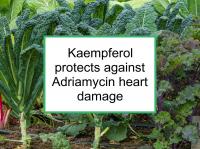A new study has reported that kaempferol, a flavonol found in foods such as kale, chives and mustard greens, reduces the cardiotoxic effects of doxorubicin in rats. The usefulness of doxorubicin, an anthracycline chemotherapy drug with powerful antitumor activity, is limited by doxorubicin-induced cardiotoxicity.
To conduct the study, the authors divided rats into two groups. Both groups were treated with injections of doxorubicin every other day for six days. However, one group of rats was pretreated with kaempferol before receiving the doxorubicin.
In the absence of pretreatment with kaempferol, doxorubicin resulted in reduced body and heart growth, as well as signs of heart damage. On the other hand, kaempferol pretreatment was found to reduce the doxorubicin-induced damage in heart tissues. Cell studies also found that kaempferol appeared to use the mitochondrion-dependent pathway to inhibit the doxorubicin-induced cardiotoxicity. Previous studies have reported that the cytotoxicity of doxorubicin against cancer cells is not reduced by exposure of the cells to kaempferol.
The authors conclude that kaempferol protected against doxorubicin-induced cardiotoxicity. They further comment that kaempferol might be a promising reagent for treating doxorubicin-induced cardiotoxicity, and may have implications in the long-term clinical usefulness of doxorubicin.
Note that while black and green tea are also good sources of kaempferol, they might reduce the effectiveness of doxorubicin and other anthracycline chemotherapy through their caffeine content.
Please see our article on breast cancer diet during doxorubicin chemotherapy for more information on how to optimize treatment with doxorubicin and minimize its side effects.
